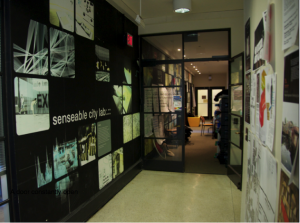Luca Simeone (http://www.luca.simeone.name), PhD in Interaction Design, with a focus on design management and design anthropology, presented on the results of ethnographic investigations conducted over a 3-year period (2011-2014). As the abstract for the seminar explained, “This 50% dissertation presents a compilation of 4 papers that investigate three academic labs – MEDEA at Malmö University, MIT SENSEable City Lab and metaLAB (at) Harvard – that use design to foster collaboration with multiple stakeholders (industry, government, NGOs, citizens, …). More specifically – using concepts such as ‘multi-sited’ from anthropology, ‘boundary organization’ from organizational studies and ‘strategic ambiguity’ from organisational communication – this study adopts different interpretive perspectives to describe the organizational approaches of the three labs and how they use design as way to set up and sustain collaboration with multiple stakeholders.”
In giving an overview of each of the four papers, Simeone drew out several key findings and potential topics for discussion. These included
- orientation and interplay: in what ways organisational components influence and get influenced by the design-based collaborative dimension of the labs
- open versus curated forms of opening production in the “hackathon” setting
- strategic ambiguity as management practice: paradoxical horizontal (small, independent teams) and vertical (hierarchical) structures of a lab like the SENSEable City Lab, ambiguity in engagement roles and communication
- multi-sited design activities: questions of what happens where in multi-sited, geographically distributed design environments
- whether to pursue a monograph or compilation dissertation format

